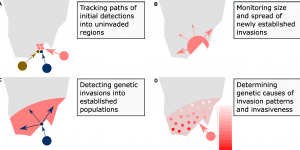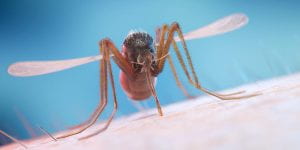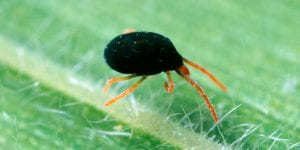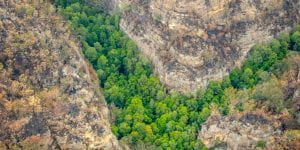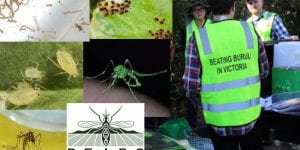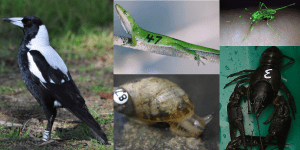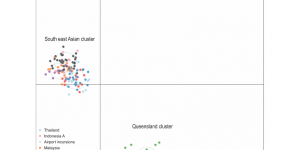Tag: spatial genomics
-
Improving mosquito control strategies with population genomics
Words: Tom Schmidt When researchers want to investigate evolutionary processes like adaptation and dispersal, they frequently make use of population genomic methods. Population genomics uses DNA data from across an organism’s entire genome – that is, across all of that organism’s DNA. This DNA data can be compared with DNA from other organisms, which can […]blogs.unimelb.edu.au/pearg/2021/06/28/improving-mosquito-control-strategies-with-population-genomics
-
The grasshopper that was lost, then found, is now endangered
This article was first published on Pursuit. Read the original article. By Professor Ary Hoffmann, Vanessa White and Professor Michael Kearney The Key’s Matchstick Grasshopper, or the Keyacris scurra, was once widespread and abundant in New South Wales, the Australian Capital Territory and north-central Victoria, but over the past century its numbers have seriously declined. […]blogs.unimelb.edu.au/pearg/2020/08/21/the-grasshopper-that-was-lost-then-found-is-now-endangered
-
Tracking the movement of mosquito stowaways
This article was first published on Pursuit. Read the original article Dr Tom Schmidt Everyone knows mosquitoes can fly. Not everyone knows they fly in pressurised cabins 10,000 metres above the ocean. In fact, many of the most dangerous mosquito species get flown all over the world in aeroplanes, or travel on boats or other […]blogs.unimelb.edu.au/pearg/2020/08/05/tracking-the-movement-of-mosquito-stowaways
-
New Pursuit article – Have resistance, will travel
This article was first published on Pursuit. Read the original article here. Authors: Dr Nancy Endersby-Harshman, Dr Qiong Yang, Dr Tom Schmidt and Professor Ary Hoffmann Around the world, pest insects – like mosquitoes – often become resistant to the insecticides meant to control them, causing problems for agriculture and public health. Resistance in multiple populations […]blogs.unimelb.edu.au/pearg/2020/05/28/new-pursuit-article-have-resistance-will-travel
-
How do we protect our unique biodiversity from megafires?
This article was first published on Pursuit. Read the original article. Authors: Dr James Camac, Nicholas Bell and Professor Ary Hoffmann This summer’s devastating Australian fires and their continuing impact on biodiversity serve as a stark reminder of the challenges in nature conservation as we head into an increasingly volatile future driven by climate change. […]blogs.unimelb.edu.au/pearg/2020/02/21/how-do-we-protect-our-unique-biodiversity-from-megafires
-
Sampling by the sea – collecting mosquitoes in the Mornington Peninsula
Words and images: Véronique Paris It’s 7.30 Saturday morning – what are your plans for the day? While you may be still in bed contemplating a coffee, or still sound asleep, I’m packing the PEARG ute with a stack of small buckets, strips of red felt, some rabbit food, and a 20lt jerrycan of water. […] -
MSc projects 2020 – Students wanted
We are seeking motivated MSc students to apply for several projects starting next year. Enquiries via pearg-queries@unimelb.edu.au Project 1/4: Exploring bacterial symbionts for agricultural pest control PEARG is researching ways to control important agricultural pests such as aphids and mites that cause millions of dollars in damage to crops each year in Australia. This project […]blogs.unimelb.edu.au/pearg/2019/06/14/msc-projects-2020-students-wanted
-
Cracking the kinship code: Measuring animal dispersal across generations with DNA
NEW paper! Dispersal is a key component of the ecology and evolution of animal populations. It allows animals to colonize new habitats, escape deteriorating conditions, and locate mates. When animals disperse and breed successfully in new habitats that are already occupied by the same species, there will be an exchange of genes. This exchange is […] -
Stowaway mozzies enter Australia from Asian holiday spots – and they’re resistant to insecticides
Original article published on The Conversation Words: Tom Schmidt, Andrew Weeks, and Ary Hoffmann We might not be able to use common insecticides to kill mosquitoes that arrive from other countries. from www.shutterstock.com Planning a trip to the tropics? You might end up bringing home more than just a tan and a towel. Our latest […] -
New review | The detection and significance of emerging insecticide resistance in mosquitoes
Nancy, Andrew and Ary have a fresh review article in CSIRO’s ‘Microbiology Australia’ journal. Below is the abstract, for the full text please follow this link. Mosquito-borne arboviruses are increasing in incidence around the world. Australia enjoys some protection from pests and diseases afforded by its geographic isolation coupled with strict biosecurity control at its […]
Number of posts found: 11
